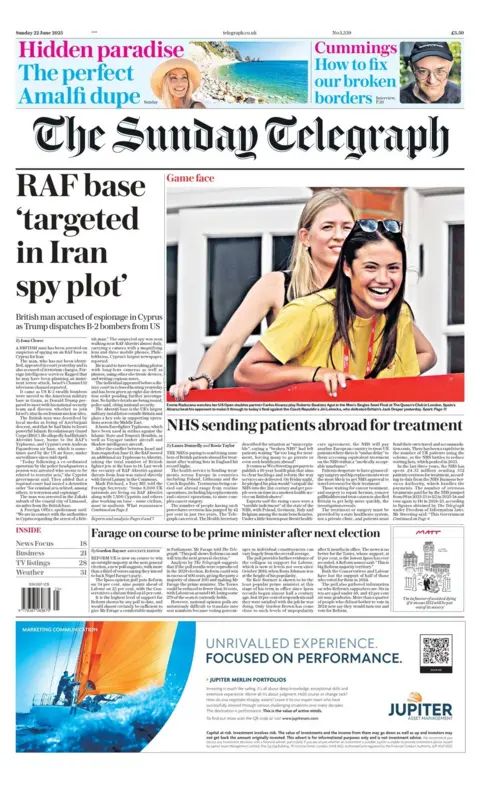In recent news, developments in geopolitics, security threats, and domestic issues have dominated the headlines across multiple UK newspapers. One of the lead stories is about the arrest of a British national in Cyprus on suspicion of spying and terror-related offenses. This individual is believed to have conducted surveillance for Iran on the RAF Akrotiri base, bringing attention to the ongoing conflict in the region. The story is highlighted in the *Sunday Telegraph*, which notes that this arrest coincides with heightened tension in Iran, particularly following recent US military actions against key nuclear sites.
The geopolitical concern regarding Iran is echoed in the *Observer,* which states that the US has deployed B-2 stealth bombers to Guam, as President Trump mulls a deeper involvement in the Middle Eastern conflict. This situation paints a dismal picture of the continuing unrest and raises questions about the future stability of the region.
Domestically, the *Sunday Express* leads with alarming news about the Home Office’s failures in dealing with asylum seekers. The paper reveals that the department has failed to recover over £50 million from companies that manage accommodation for asylum applicants, as they profit way beyond the government-imposed limits. The *Express* reports that the system remains under “exceptional pressure,” prompting urgent calls for reform.
The National Health Service (NHS) is also extensively covered, demonstrating significant strains on the health care system. A report in the *Sunday Telegraph* highlights that the NHS is increasingly sending patients abroad for treatments, with a surge of 42% over the past two years. Health Secretary Wes Streeting has labeled the situation as “unacceptable,” expressing government intentions to “turn the NHS around” amidst high waiting lists.
Meanwhile, the *Sunday Times* takes a closer look at the heated debate surrounding assisted dying legislation, which has gained traction in the media. The report emphasizes the concerns of health officials, especially regarding resource allocation within the NHS if this controversial bill is passed.
In lighter news, the birthday celebration of the Prince of Wales, William, features prominently in various papers, including the *Sunday Mirror*. Highlighted by environmental campaigners, his efforts towards ecological sustainability are recognized in the headline “My pal Wills brings hope to the planet.” The prince, who turned 43, continues to use his platform for environmental advocacy, a point reiterated in numerous articles focusing on his contributions to climate change discussions.
Moreover, the *Mail on Sunday* focuses on the controversial Employment Rights Bill, urging business leaders to oppose what is termed a “wrecking ball for the UK economy.” The paper claims that the implementation of such a bill could significantly undermine business operations, as many firms express concern over potential impacts on their workforce management.
In addition to serious political and social issues, tabloids like the *Daily Star Sunday* and *The Sun on Sunday* bring forth lighter stories touching on celebrity culture, such as reports of a UFO encounter from actor Danny Dyer, and controversial imagery concerning a convict from reality TV.
As several of these stories unfold, the implications are vast, not only affecting national security and public policy but also shaping the public’s perception of the government’s handling of pressing issues. Given the breadth of topics covered, it’s evident that the UK’s newspapers reflect an intricate tapestry of societal issues, balancing pressing political narratives with more trivial personal anecdotes that highlight life and culture. Each story paints a unique perspective of life in the UK, revealing a nation grappling with its challenges while attempting to retain a sense of hope and community.



